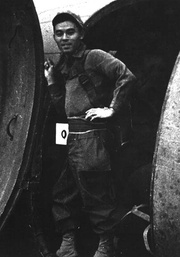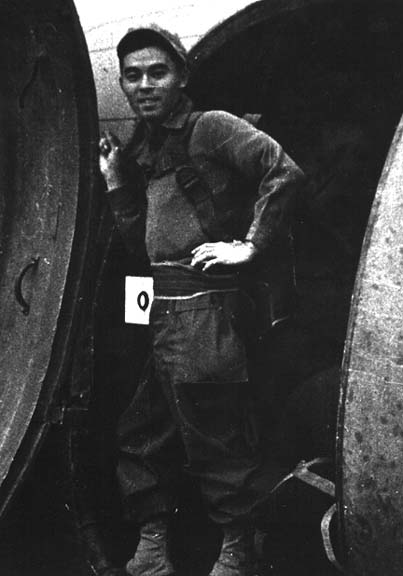
Japanese American Military Experience Database

Shigeto Ken Mazawa
MISLS (Graduated Savage, Dec. 1942)
AAFAIS, Air-Force Intelligence
China-Burma-India Theater
SEAC-New Delhi, India
NCAC(G-2), Northern Burma
OSS, Det 101, Kachin Rangers, Burma
Other Countries: SEAC-New Delhi, India; Myitkina, Burma (NCAC)
Also combat field operations.
Bronze Star Medal for volunteering to parachute into combat areas in Burma to join OSS 101 Detachment's Kachin Rangers.
In New Delhi, India, slept on wood-framed bed covered with a mosquito net. India's unbearable heat without air-conditioning was a hardship that had to be tolerated.
Had to rely on a sleeping bag infested with bed bugs and fleas, spread over jungle bushes in the jungle.
Bathing in streams was a luxury if one could be found.
In Burma, monsoons were like shower baths, like it or not.
C-rations and K-Rations were our main sources of food at times. Other times, we obtained chicken and/or cow meat from native villagers to supplement what we had. Kachin soldiers under my command tried to feed me monkey flesh, but I politely refused as I was afraid to upset my delicate stomach!
There was no entertainment once we hit the trails in the jungles but USO groups did come to Northern Burma to entertain GIs on hastily constructed stages. Ann Sheridan, Joe E. Brown and others came with them.
If we were lucky while in cities waiting to fly up to front lines, we had people from the Red Cross serve us cold drinks and ice-cream.
We also enjoyed recorded sentimental music and for exercise, Ping-Pong tables. Other times we were able to see movies under thousands of stars in the jungles. I remember once, having to scatter in all directions when the sound of enemy planes circling over-head was heard.
Walking day after day during Monsoon seasons wearing only a pancho in the heavy rain isn't fun to say the least.
While stationed in New Delhi, the capital of India, I visited many temples and even had a chance to see the famous Taj Mahal in Agra, one of Seven Wonders of World. It was no-no to aim a camera at women wearing veils. You were also not allowed to bother the sacred cows. While on a convoy, I almost hit a sacred cow lying down lazily in middle of a dirt road and was reprimanded.
2). Although I had no knowledge of parachuting, I had no fear about jumping when I volunteered to do it into the Burma jungles. I was told it's risky but no reasons were given. I was to jump from a C-47 transport, and 'brace yourself' was about the only instruction I received. I did not have to pull the rip cord either as it was on a static line inside the plane. We had no auxiliary chutes in those days; I never knew the difference. Slight fear overcame me as I faced the wild jungle way below from inside the door. A tap on my shoulder was my signal to step out without hesitation. Once out the door, I forgot all about my fears and gazed at the fully-opened chute above me against the morning sun. I landed safely but I suffered a painful stomach later from the pressure change. I was lucky not to hurt my heels when I landed like another man did.
3). After joining up with Kachin rangers we headed down the jungle trails in convoy. It did seem odd to see our convoy using elephants to carry our equipment. I always thought elephants mostly roamed in Africa. Moving lazily with huge Ding-Dong bells on huge necks in enemy territory, the elephlants looked rather comical.
4). Our rangers relied upon plane-drops for provisions while moving in jungle trails. Low flying C-47s would occasionally drop rations without chutes which was very dangerous for us on the ground. I remember one K-ration crate cracked open and spread boxes like shrapnel and even killed one Kachin soldier.
5). A package of fruit-cakes from the U.S. a day before Christmas was heart-warming as we shared with the rangers. On Christmas eve, to our surprise, we were entertained by the local missionary parishioners singing 'Silent Night' as we sat around fires recalling Christmas at home. It brought tears and it wasn't smoke from the log fire.
6). Talk about a memorable sight, seeing the Statue of Liberty as our troop transport slowly approached N.Y. harbor was something to remember.
7). While Kachin ranger battalion Co. D was moving southward, we received orders from NCAC Hq to disperse a guerrilla unit harassing natives along the China-Burma border, infiltrating from China. Four companies of Kachin rangers moved swiftly over the border and dispersed after skirmishing. The Rangers brought back a prisoner who was interrogated by the company I was with. The rangers were getting impatient with the prisoner for not providing any information and decided to take 'extreme' measures. Since I was in command at that time, I had to make a decision as to what to do about this. I did not understand why the rangers wanted to do this. I finally decided to hold him until the following morning for the battalion CO to handle. The prisoner was tied and pegged down on the ground. I had them loosen the ropes a little, feeling a little sorry for him, which was a mistake as it allowed him to wiggle out and escape before dawn. I was relieved to know that I no longer had to deal with him. Later as we were returning to home base, we ran into him with other Chinese soldiers. I was stunned to face him as a soldier in a GI helmet handed me a document explaining the prisoner's identity. It was written in Chinese Kanji, which I was barely able to make out but the essense was that he was a regular army officer, not a guerrilla as first suspected. Excited Kachins were getting restless, and it was not a time to argue. An amicable ending was needed at least for the time being. The following day, unexpectedly, we were confronted by delegates of the Chinese Army, complaining of the attack made on them the previous day. Both sides gathered in a farm shack, sat face-to-face at a table. Three long-winded sessions followed. Our CO even pounded the table angrily to no avail. There was a lot of confusion, and no ending could be foreseen. We were surrounded by Chinese soldiers, and as the suspense increased, we could only pray for a peaceful ending. The three sessions lasted with no compromise. Our frustrated CO gestured to end further talks and shake hands to 'Let bygones be bygones.'
8). I was anxiously waiting for a chance to take a historical picture of these groups with my pet camera that I had with me ever since leaving the States. Unfortunately, only one frame was left of Kodachrome film that was very hard to get in War-time. I didn't want to miss this rare shot. I gave some operating instructions to a Burmese soldier. Luckily turned out ok, and it appeared in 'True' magazine in 1959, in conjunction with an article called 'Betrayal in China' by Tom Chamales, which was later made into a movie, 'Never So Few', starring Frank Sinatra and Steve McQueen. This incident seemed insignificant at the time and I never expected it to be controversial. It also made waves however, among some Chinese officials in Washington after a book about this incident was published.
9). Many MIS Niseis played significant parts with devotion, and their contributions were enormous. They were 'Unsung Heroes,' but due to top secret status of their deeds, it was not until much later that their stories were made public. Some of the many MIS Niseis who served in Burma have already passed away, but their achievements must be remembered, and noted in Japanese American National Museum projects along with great heroic achievements by the 442nd, 'Go For Broke' units.
10). As an epilogue, I would like to insert few line which were typical of many incidents which occured between Niseis and their parents. When an article about me serving in the MIS and later with Kachin Rangers appeared in 'True' magazine, it was translated and appeared later in a Japanese magazine. When my father got hold of it, he was greatly disturbed. He was not fully-aware of the circumstances and had imagined my aiming a gun against our ancestors. An incident similar to this was made into a Japanese movie 'Snka Moyu' with Nisei brothers encounter each other on opposite combat forces. It was fiction ending in tragedy for one MIS Nisei. While on the Burma front lines, I often thought about my young brother in Japan. He could be in the Japanese Army and I could have run into him as the Hiroshima Division was active in and around Northern Burma. I also thought about the atomic bombing of Hiroshima, worried about my parents who were living there at that time. Luckily, I survived in spite of the dangers in Burma and feel comfortable about the service I rendered in the US Army.
Since my parents were stuck in Japan, I never missed home.
As I was a photography enthusiast, I missed dark room facilities to develop films.
2) I was sorry to hear about the passing of Mari Sabusawa Michener whom I worked with during the first JACL convention in Chicago many years ago while she was living there. We covered the convention with cameras, movies and stills and she told the stories. When I was with Chicago's 'Scene' mmagazine, she was a contributor.
3). I recently received a book titled 'Honor by Fire', by Lyn Crost, former war correspondent with The Associated Press in Washington, D.C. during WW II. She covered the 100th Battalion/442nd regimental Combat Team and the Nisei who served in the Army, Navy, MIS and OSS in the book. I noticed that my experience in Burma with Det. 101, OSS was mentioned briefly, to my surprise, as I never met Lyn Crost.


